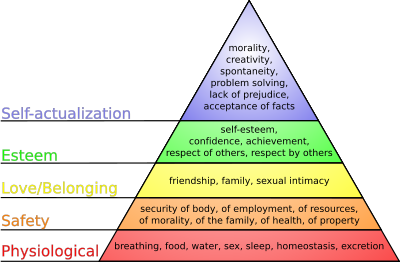Remember Maslow’s hierarchy of needs? Sure you do. It is usually presented something like this.

You start at the bottom with the most basic needs. As basic needs are met, you go up the pyramid. I’ve seen a few of these pyramids. They usually list the same stuff for basic needs — air, water, food. They always forget the same basic need — care.
Man was born free, and he is everywhere in chains. — Jean Jacques Rousseau
I blame Rousseau, myself. Man is not born free, he is born attached to his mother by a cord and is not capable of looking after himself for at least seven years (seventy in some cases). — Katherine Whitehorn
I often think of those two quotes, especially when people ask why there are so few women anarchists and libertarians. The recent anarchist survey came back with 82% of the respondents being men. Libertarian surveys also have lopsided results.
Why?
When I lived in California, I worked for a small nonprofit that assisted caregivers of people with brain impairments. I picked up the phone one day and spoke to a client who had just received her first bit of respite. That’s where we provided money for the caregiver to hire someone for a couple hours. The woman had been taking care of her husband since his motorcycle accident a decade before. She was crying. She said it was the first time away from her caregiving responsibilities in all that time.
Our program was paid for in large part by tax dollars, both state and federal. Who do you imagine that woman was going to vote for when the time came? Do you think arguments about taxation being theft are going to persuade her that she should forgo those precious few government-funded moments of freedom? How does your vision of freedom actually help her? Are you going to go take care of her husband for her?
The vast majority of our clients were women, more than 80%. Nationwide, the vast majority of people providing care for aging or disabled family members are women. And even where men do provide care, they usually spend a lot less time doing it. All that care has a cost. Caregivers are stressed out. They are depressed. They earn less money. They don’t take care of themselves. They are struggling.
Women are seen as caregivers. Women see themselves as caregivers. It is what society expects of us. The expectation is that we are supposed to want to play that role, to relinquish our freedom willingly out of selfless motherly/daughterly/wifely love. Why would talk of freedom be expected to resonate with people who aren’t even allowed to want it?
There is a small part of biology involved in the idea that women are caregivers. Those women who are able and choose to get pregnant have a biological caregiving role. But the caregiving role that women are expected to play goes way beyond what is biologically determined. The ability to get pregnant does not make someone caring. Once a child is out of the womb, there is no biological rule about who should or would do the best job of caring for them. The fact that women are the caregivers in our society is socially constructed.
That doesn’t just suck for women, by the way. It sucks for men too. I worked for divorce attorneys for many years. Some of those bitter, “men’s rights” activists do have a legitimate gripe. I saw many men get screwed in their divorce because, historically, the default was for kids to be with their mother – the caring one. I saw kids begging judges to live with their father, only to be denied. It happens. I hate to agree with those schmucks on anything, but the sun shines on even a dog’s ass some days.
And if the gendered nature of caregiving weren’t damaging enough, our “independent,” nuclear family focused, transient society has taken away the collective caregiving that women have historically depended on. Now we are expected to take care of our kids and our aging parents, often at the same time, and with little or no help from other family members or the community. Is it really a surprise that, as women’s caregiving responsibilities increase, they become more liberal?
I don’t claim to have definitive answers on why women aren’t responding to anarchist and libertarian philosophies in the same way men are. But I do think that the gendered nature of caregiving, how little most men talk about caregiving, how central caregiving is to our lives, and how much caregiving restricts our freedom has to be a factor.
And I find it interesting, in the context of this discussion, that so many anarchist and libertarian women are childless or did not participate in the raising of their children — Emma Goldman and Voltairine de Cleyre, for instance. I would be very curious to know how many anarchist and libertarian women are mothers. Most women are mothers. If we can’t reach mothers, we can’t reach women.
The fact is that every one of us had our baby diapers changed by a woman. And there is a damn good chance that your adult diapers will be changed by one to. Complete independence and freedom are an illusion. It is an illusion that women are not in a position to hold. We are interdependent. And we are only free in so far as everyone is willing to share in taking responsibility for the caregiving that is a fundamental need for all humans.
Whoever is addressing the real life situations that women face is going to get their attention — whether that is liberals offering government social programs, conservatives offering church social programs, or anarchists offering something new. Talk to me about how to have the freedom to pursue my dreams without leaving a mountain of young, old, sick, and dying to fend for themselves and I’ll listen.







